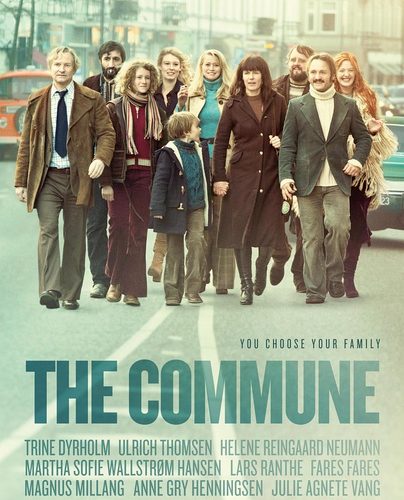Thomas Vinterberg has yet to re-attain the heights of his 1998 breakthrough feature, the vehement Dogme inaugurator The Celebration. His focus on the scabrous underpinnings of interpersonal relationships has remained more or less constant, but his treatment of the subject has lost its trenchancy, and films such as Submarino and The Hunt are too willful and calculated in their abrasiveness to achieve genuine insight. Vinterberg co-wrote those later features with Tobias Lindholm (director of the excellent A Hijacking and A War), and the two Danes reunite for The Commune. While surprisingly moderate by the pairing’s standards – no child molestation, lynch mobs, drug addiction, or suicide this time around – their latest attempt at dissecting the human condition ultimately reveals itself to be as cynical and glib as their previous collaborations.

What Vinterberg has always excelled at is realizing despicable male characters, and he again proves his talent with The Commune’s protagonist, Erik (Ulrich Thomsen, who also played the lead in The Celebration). A middle-aged architecture professor with serious anger-management issues, Erik’s first seen rebuffing condolences offered for the loss of his father, whom Anna (Trine Dyrholm) and Freja (Martha Sofie Wallstrøm Hansen), his wife and 14-year-old daughter, respectively, have never met. Despite the filial acrimony, Erik has inherited his father’s giant, gorgeous house, which he intends to sell right away. Feeling like their life could use an injection of vitality, and inspired by the spirit of the times – this film is set in the mid-1970s – Anna convinces Erik to keep the house and found a commune instead. Interviews are held and six others, ranging from friends to strangers, are invited to move in.
Like Anna, Erik also experiences a midlife longing for excitement, and he pursues it by starting an affair with Emma (Helene Reingaard Neumann), one of his students who bears a striking resemblance to Anna. The scene in which he tells Anna about his affair is almost unbearably cruel. Although he exhibits complete indifference to her feelings, Anna responds with desperate devotion and suggests that Emma move into the commune as well. This development already strains believability, but that both Erik and, especially, Emma also embrace the idea is simply too difficult to swallow, sapping a lot of strength from the predictable emotional turmoil that ensues.

Despite its title, The Commune affords surprisingly little attention to the commune itself. Aspects like the cohabitation’s day-to-day dynamics and logistics, or the reasons that would motivate such a disparate group of individuals to live together, are treated perfunctorily, while the entire project’s underlying philosophy and politics – beyond the characters’ generally left-leaning inclination – are neglected altogether. The only time politics even receive a direct mention is in the form of a background news broadcast reporting on the escalating tension between Cambodia and Vietnam. Following their introduction, the commune’s other inhabitants’ role is essentially relegated to that of window dressing while the narrative centers on Erik and Anna’s deteriorating marriage.
In his film Together, the Swedish director Lukas Moodysson also used a ’70s commune as the context to explore the difficulty of reconciling one’s instincts with one’s chosen principles. However, by considering the specifics of commune life and the political fervor of the decade, he simultaneously drew a compelling portrait of a specific culture and era. The Commune, on the other hand, ends up probing largely universal quandaries to lackluster results.
By the end, arch-egoistic Erik has mistreated Anna, Emma and Freja, and this story wraps up with Freja falling in love with a boy who looks to be as callous as her father. Vinterberg tries to endow his narrative with a feminist sensibility, but, considering how thinly he’s sketched both Emma and Freja — and the emotional abuse he’s put all these women through — if anything, women are merely held in marginally higher esteem within his general misanthropy.
The Commune premiered at the 2016 Berlin International Film Festival and opens on May 19, 2017.

